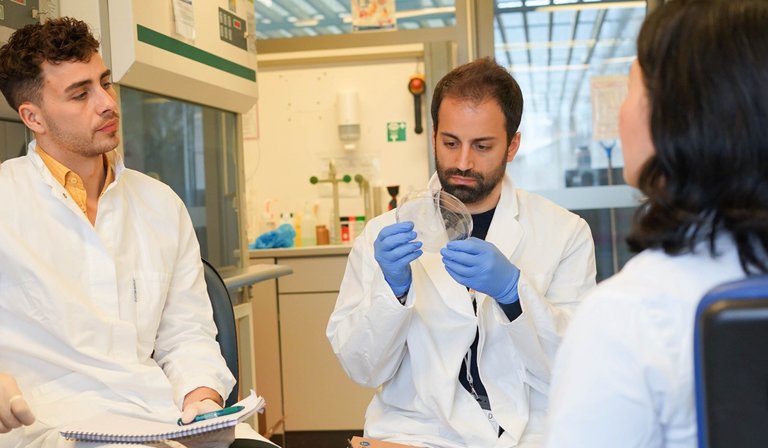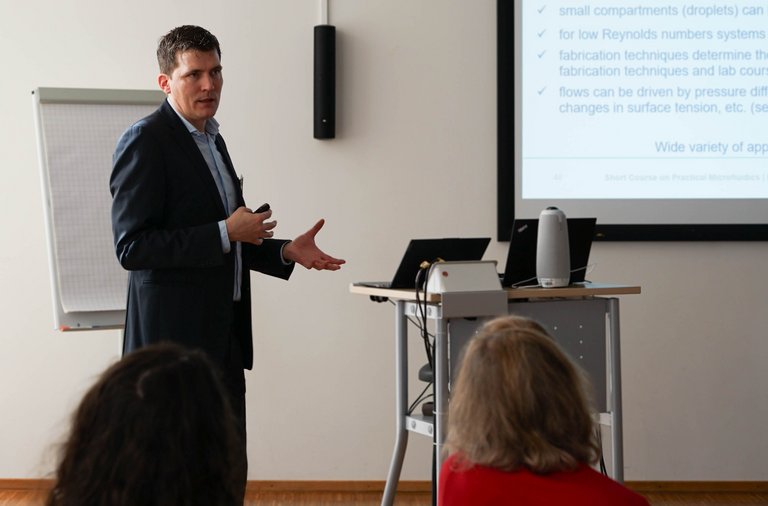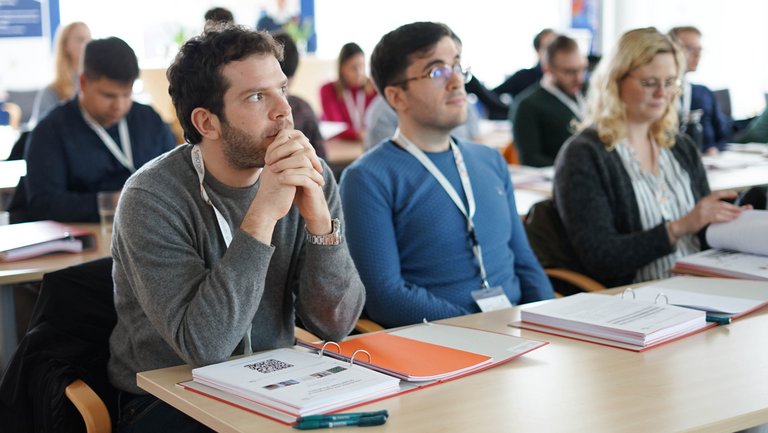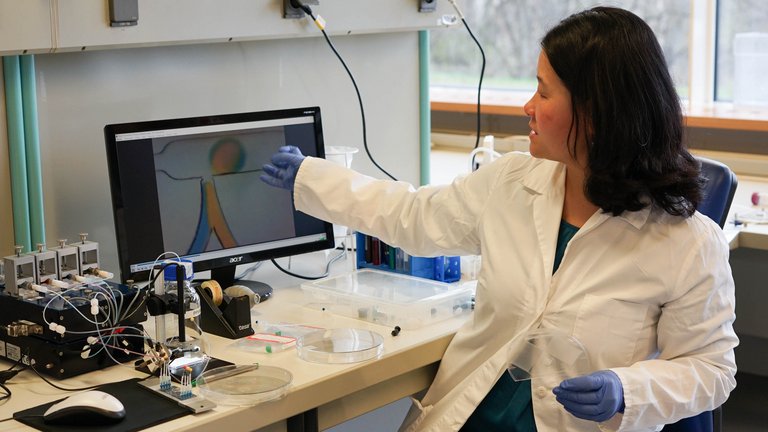At an interdisciplinary short course from 18 to 20 March 2024 at TU Ilmenau, 20 doctoral students, scientists and researchers from industry from all over Europe and the USA have come together to familiarize themselves with the diverse application possibilities of microfluidics. The "Short Course on Practical Microfluidics" takes place for the third time at TU Ilmenau and is led by Prof. Christian Cierpka, Head of Engineering Thermodynamics at the Department of Mechanical Engineering.
From environmental analysis to the treatment of diseases: Short course provides insights into practical microfluidics

"The aim of our course is to give participants a practical introduction to the diverse areas of application of microfluidics and to explain the often astonishing effects that make microfluidics completely different from the macroscopic world in many situations," says Cierpka. As a branch of fluid mechanics, it is concerned with transporting the smallest quantities of liquid or gas – through channels and networks with a diameter of less than 100 micrometres, i.e. thinner than a hair – but also with separating them from each other, mixing them or processing them in other ways.
Key technology for many high-tech applications
For their basic research and its applications, the engineering sciences make use of nature as a role model. For example, the water in a tree travels through tiny channels and capillary forces from the soil via the root to the tip of the leaf: "We encounter applications of such microfluidic systems everywhere in our everyday lives, from inkjet printers to pregnancy tests, and the technology is the key to many high-tech applications – whether in environmental analysis, materials research, food technology, or for the diagnosis and treatment of diseases," says Prof. Christian Cierpka. For example, microfluidic systems can be used to test patients for cancer cells or supply them with insulin or painkillers via micropumps. They can also be used to detect harmful chemicals in the soil.

In the short course on microfluidics, Prof. Christian Cierpka, Prof. Steffen Strehle, Prof. Hartmut Witte and Dr. Alexander Groß from TU Ilmenau, Prof. Steffen Hardt from TU Darmstadt, Prof. Massimiliano Rossi from the University of Bologna and Lars Dittrich from 5 microns GmbH provided an introduction to the fundamentals of microfluidics and related disciplines that use microfluidic phenomena: microsystems technology, biomicrofluidics, droplet-based microfluidics, electrokinetics, flow characterization, and microfabrication. To enable participants to build their own microfluidic systems, they also received a theoretical overview of manufacturing techniques such as photolithography and the design of special chips used in microfluidic systems, as well as various optical methods such as particle image velocimetry (PIV), particle tracking velocimetry (PTV), and three-dimensional techniques.
The theoretical introduction was supplemented by practical sessions in the laboratories at TU Ilmenau, where workshop participants could gain their first practical experience with techniques for measuring flow fields in microfluidic systems, build their own chips using soft lithography, learn about data processing and carry out their own laboratory work. "By working in small groups of no more than four people, we can also take into account the individual needs of the participants and they have the opportunity to exchange ideas intensively with each other and with the lecturers," says Prof. Christian Cierpka:
Although these small groups make the course time-consuming for us as organizers, they have always been perceived as a tremendous added value, which is why we also had to limit the number of participants in 2024 and the course was quickly fully booked.
This year, young scientists and researchers from Sweden, Portugal, Poland, the United Kingdom, France, Italy, the USA and Germany have been taking part in the short course. One of them is Seth Rowland-Crosby, a PhD student in bioengineering at Newcastle University.
Much of my work has been based around fabrication, i.e. the pracical aspects: learning how to make devices, testing and trying to characterize them. But I've never had a formal introduction to microfluids and the theories supporting it. So this course is a good opportunity for me to learn that theoretical side and to talk about it with experts in the field.

Riccardo Spena from Florence, a doctoral student at Procter & Gamble with a special interest in regenerative medicine, pharmacology and tissue engineering in healthcare, i.e. the artificial production of biological tissue to replace diseased tissue, has also taken advantage of this opportunity: "Because our project is a 'green project' we want to use the microfluidis to substitute some elements we use in the company's processes with microfluidics in order to have more eco-compatible and sustainable elements'". André Girão, a postdoc at the Universidade de Aveiro, learned about the course from his colleague:
I am brand new in the field und I am using this course as a starting point for new experiments and to get a bunch of new tools for me to use in the future for the design and manufacturing of scaffolds for tissue engineering.
Together with Dominik Grachala, a doctoral student at the AGH University of Krakow in Poland, they explored the so-called 2D-concentration space in droplet based microfluidics on the first day of the workshop. "Droplet based microfluidics use droplets as test tubes to investigate chemical reactions and biological processes in the smallest of spaces," explains Dr. Alexander Groß, research associate at the Institute of Physical Chemistry/Microreaction Technology at TU Ilmenau:
For example, flows within the nanoliter droplets can be used to mix particularly quickly and thus go beyond existing screening technologies.

Participants in the lab course with Dr. Jialan Cao-Riehmer learned how this works in practice. As Head of the Microfluid Biotechnique junior research group, she uses droplet-based microfluidics to develop environmentally friendly microfluidic high-throughput processes to test the effect of drugs on cells, monitor water quality, detect pollutants or precisely control and accelerate plant development processes, among other things. In another laboratory practical, Dr. Jörg König, research assistant and Head of the Microfluidics Laboratory at the Engineering Thermodynamics Group, demonstrated work with a micromixer that uses acoustic surface waves to quickly mix liquids in microchannels and separate particles or cells such as cancer cells according to their properties such as size, compressibility and density – a key area of research in the department's microfluidics group.
Insights into high-tech manufacturing techniques at the Center for Micro and Nanotechnologies
In addition to these practical sessions and lectures, the doctoral students have also gained an insight into high-end manufacturing techniques in the Center for Micro- and Nanotechnologies, which has the largest contiguous university clean room in Europe with an area of 1,200 m². Furthermore, manufacturers of devices and measurement technology for microfluidics provide information about the latest high-tech products such as the E-PunCh micropump. 5microns GmbH developed this chip-integrated, energy-efficient and cost-effective micropump in collaboration with the Technical Physics Group at TU Ilmenau. It comes without mechanical components such as valves and membranes and makes it possible to dose the smallest quantities of liquids in the order of a few nanoliters, which can be used, for example, for environmental analysis, medical technology, or the automotive industry.
Immediately following the short course, the 12th "Workshop of Chemical and Biological Micro Laboratory Technology" will take place at TU Ilmenau, bringing together international researchers in the field of microfluidics and related disciplines to share their experiences and research results.
We are delighted to once again welcome numerous scientists from the USA, Sweden, France, and Germany as keynote speakers at the TU Ilmenau this year.
Contact
Prof. Christian Cierpka
Head of Engineering Thermodynamics

